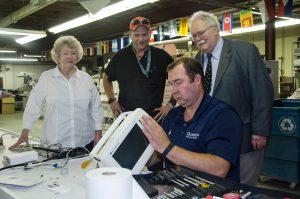
Melissa Mershon, president and CEO of Supplies Over Seas, left, is pictured with Courtney Nanny, Gordon Tobin, M.D., and Mike Robinson at Supplies Over Seas. KMA’s Kentucky Foundation for Medical Care provided a grant for testing equipment for the Medical Surplus Recovery Organization to ensure donated medical equipment is usable by organizations receiving the equipment.
There’s WASTE—4 to 6 million tons of medical waste is created each year; 85 percent is reusable.
There’s WANT—6 to 10 million children worldwide will die before their fifth birthday due to lack of access to health care.
Then there’s a SOLUTION—MSROs, or Medical Surplus Recovery Organizations. In Kentucky, that’s Supplies Over Seas (SOS), a Louisville-based nonprofit that gathers medical surplus throughout the commonwealth, as well as southern Indiana and southern Ohio, and matches it to medical needs around the world. There are only 15 MSROs across the country.
The Kentucky Foundation for Medical Care last year awarded a $3,000 Community Connector grant to SOS for equipment and batteries to test medical surplus items to ensure their usability. The organization is connected to Gordon Tobin, MD, of Louisville, a 2014 KMA Community Connector. The Foundation awards grants annually to organizations that have connected to graduates of the program.
Melissa Mershon, president and CEO of Supplies Over Seas, said without the ability to test equipment, SOS couldn’t provide some much-needed items for health systems that need them. The organization received 153 tons of medical waste in 2015, up from 64 tons in 2011. That includes medical equipment like hospital beds and incubators, as well as dry goods like bandages and tools.
Volunteers sort the items and/or determine whether they are usable. For larger medical equipment, biomedical engineers must test to determine whether it is useable. KentuckyOne Health Care provides time for its biomedical engineers to volunteer, and University of Louisville biomedical engineering students come in regularly to help test the large equipment.
“Like the Goodwill, not every donation is a good donation,” Mershon said.
Usability could be determined by whether the equipment has been recalled, whether consumables needed in the equipment are available, and whether the equipment works. SOS uses a color-coded system of green, yellow and red; green if it’s good to go, yellow if it’s workable and needs something simple to make it work and red if the equipment is something many people need but a particular piece is only good for parts.
In its 23 years in existence, SOS has met medical needs around the world, from places like Haiti and Uganda to Jamaica and Mexico. Supplies go out the door in everything from a suitcase to a box, a pallet or a shipping container. Physicians going on mission trips can contact SOS for needed supplies. For those who cannot visit the SOS Medical Team “Store,” SOS will pack and ship custom boxes. SOS offers custom-packed shipments for groups planning large-scale projects or for clinics and hospitals abroad in need of supplies. SOS also ships 40-foot cargo containers filled with medical supplies and equipment to hospitals and clinics around the world.
“The beautiful thing about what we do,” said Mershon, “is that we gather surplus that is useful and redistribute it to communities in need.”
The supplies and equipment are donated by physicians and hospitals in the SOS service area. The volunteer time from groups, especially from the UofL students, leaves a mark on the Louisville community.
“We’ve not only gotten medical equipment out to people in need, but we’re also training people who will be assisting doctors in hospitals here,” said Mershon. “We couldn’t do this without your grant.”
She believes the grant will help SOS test many pieces of equipment.
“The exponential good this grant will do for this organization is enormous,” she said.

